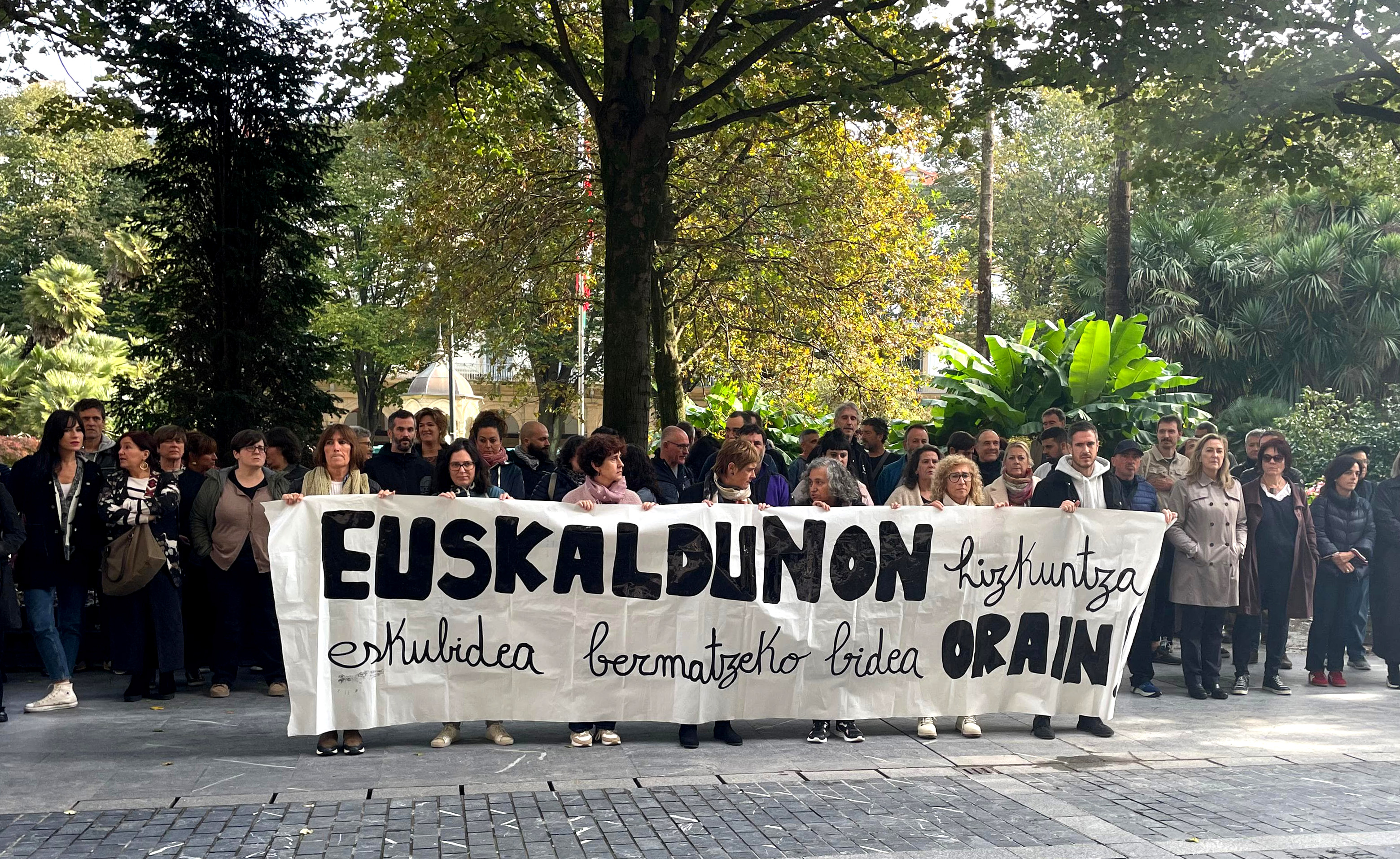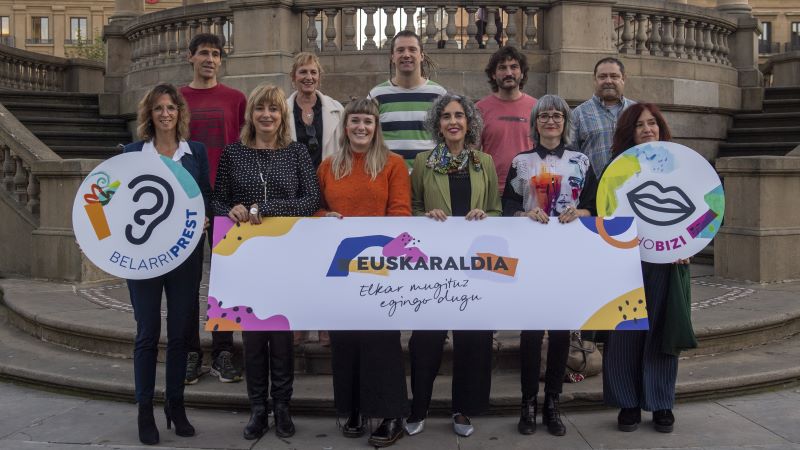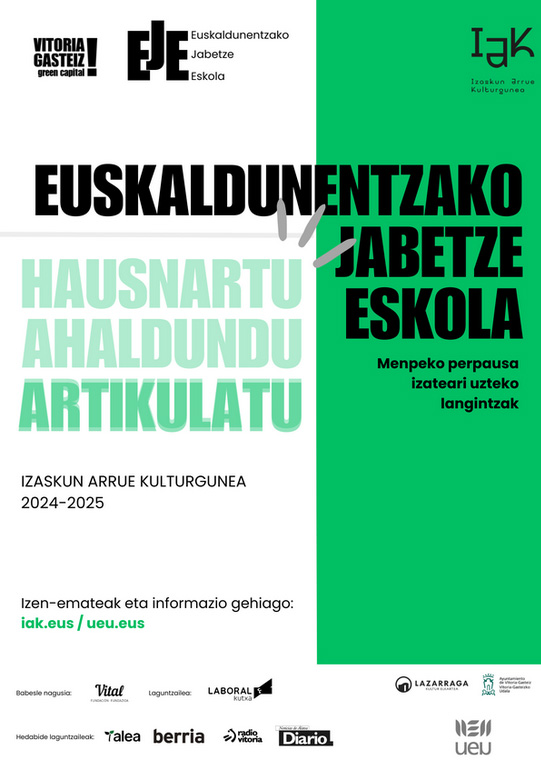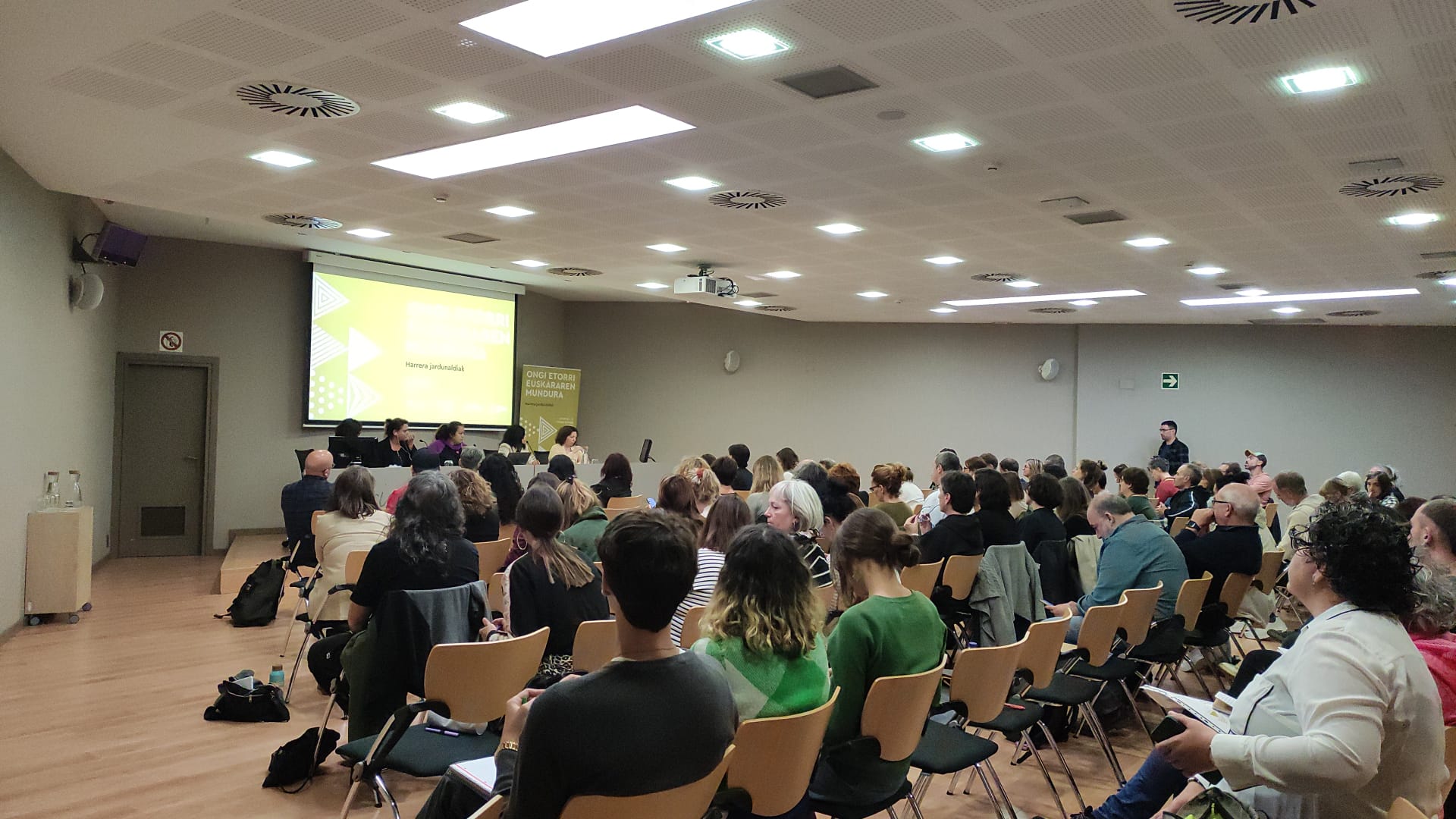Three eyes to the future
- Tens of thousands of people come from doing an exercise to shake up the language habits in the wave of Euskaraldia, and we are in full at the Korrika, which takes thousands of Euskaldunes and Euskaltzales to the streets. The objective of both is to activate the vascospeakers, to move the use of the tongue to the first line. We have come to three major agents of the world of Basque culture to analyze where steps should be taken in these times that have been called "the new time".
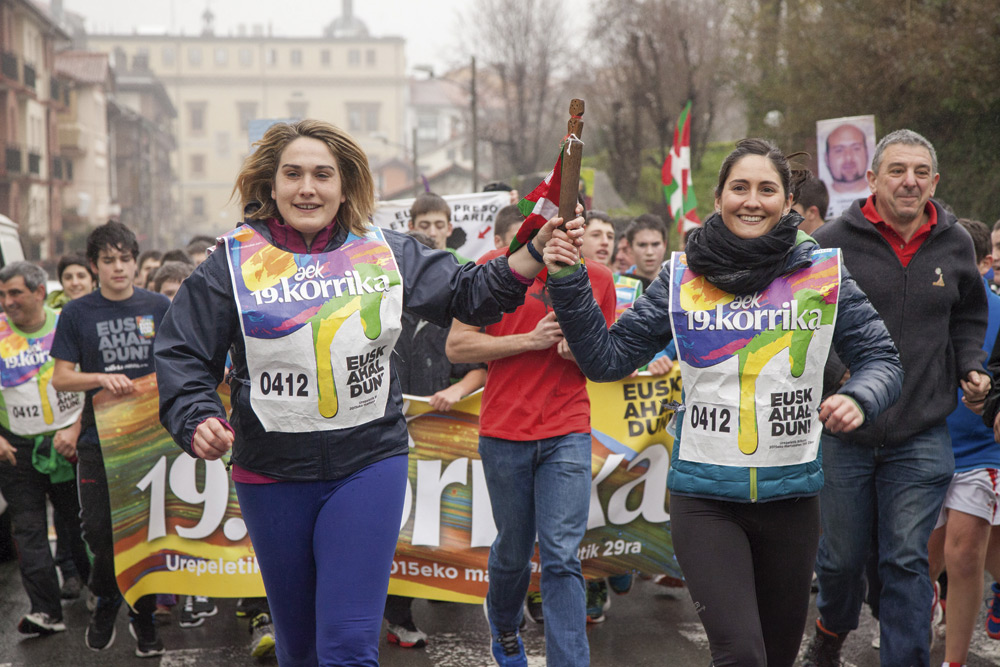
"The challenges are not just for the agents of the Basque world"
Mertxe Mujika, AEK Coordinator
It is said that Basque cultural activity is on the verge of a new stage after humiliation. What are the indicators of this new time?
To begin with, I myself would not insist so much on bookkeeping; I would say that Euskalgintza has continued to work, but each in its field, and that, often, the work done has not been seen or valued beyond the circles of the Basques. For example, in Euskaltegis we have faced the decrease in the number of students, every two years we have successfully organized Korrika… That being said, it is true that we can be facing a new time, and among the signs of this would highlight the path that has opened up to cooperation between administrations and agents of the world of Euskera, such as the Euskaraldia or the agreement signed in the field of the media, and the engagement of many new agents.
.jpg)
What are the challenges of the Basque agents from now on?
I'm sure it's not always worth it. Furthermore, I believe that the challenges are not only for the agents of the Basque world, since the normalization of the Basque country does not depend only on our work. However, I believe that the challenges of the agents of the Basque world are in the following areas:
· Universalization of knowledge: This is an issue that needs to be addressed in greater depth. Half of the population of Euskal Herria does not yet know Euskera. If this situation is not reversed, it will hardly take a massive leap in use.
· Euskaldunization of the world of work: We have a unique opportunity to influence the world of work! In the administration, for example, a lot of retirements are expected over the next decade. The workers who enter then will, at least in part, be guaranteed the knowledge of the Basque Country. In the procedures for admission to employment, access to the Basque country must necessarily be ensured. In addition, in many companies there will be changes in direction, and people who join the need will also have a commitment to the Basque country. It is, of course, a field that must be cared for with mime and care.
· Development of a comprehensive and public language policy: We need planning that covers all areas and the whole of Euskal Herria.
· We will also have to address the wave of immigrants before it is late: Those who come will have to see that they have come to a people living in Euskera. The Basque country should be a tool for the integration of citizenship. In Euskal Herria, we have known many generations that have not been born here; many, moreover, have not had or have remained out of the euskera.Tienen that knowing that they live in a people that has the Basque, and above all, I believe that the Basque can greatly help to unite society as a whole.
What are the knots?
The diagnoses are shared, I would say that we've gone a long way into it. Measures must now be put in place, and it is precisely in this task that we often get stuck. I see a knot that will disrupt over time.
We are in the next stage of Euskaraldia. What did it do and what did it not do?
It has served to reflect on linguistic habits, and I give it great courage. It has served to increase collaboration, at least in some places. What has it not been for? For it is the way to secure the future of the Basque Country; for this, together with Euskaraldia, many other things must be done.
At a time when relations between social agents and public institutions are better, is there no risk of it becoming warmer on the path of normalization of the Basque Country?
It may be, but avoiding danger is in our hands. The key to this is to recognize each other's work and to act honestly, and when you have to criticize, to do it as a way to improve your own work. I believe that we must acknowledge the work that has been done. I, rather than risks, see possibilities, but for that we also have to change the ways of working, we have to have shared governance, create spaces to work together, put in place plans worked together… As we have said before, the recognition of everyone’s work is necessary.

"We have the best bases and conditions of all time to give new leaps"
Jasone Mendizabal, Topagune Director
It is said that Basque cultural activity is on the verge of a new stage after humiliation. What are the indicators of this new time?
Many agents of the world of Basque culture have had the feeling of not cheating, because we have seen indicators about Euskera far from achieving the goals we had after so much work. I would say that we are willing and willing to leave this circle, and among the symptoms I see, I would highlight the renewed and strengthened atmosphere of trust in the Basque world, the fresh activation of Euskaltzale citizenship, the emergence of new speeches, cooperation with the institutions and the desire to jointly address new challenges. We have the best bases and conditions for new leaps.

What are the challenges of the Basque agents from now on?
I would mention two priority challenges: the first linked to need, the world of work, and the second linked to enjoyment, the space free of leisure and culture. Nothing has moved from the “elephant” presented to us by Patxi Saez in 2015. If the highest exponent of the bleeding is mentioned, I would say that the effort made by thousands and thousands of young people to learn Euskera since childhood is wasted when it comes to the labor world, mainly in Spanish. Through the school we have the responsibility to take advantage of the public investment of decades to euskaldunify children and can be a fundamental source of motivation to use Euskera in the younger ones. But it's a necessity, and when young people come to work, they enjoy a real life outside school, and this time is getting longer and longer. I would therefore speak of a joyous and creative space for leisure and culture, together with the world of work. There are more topics that can be strategic: the universalization of the Basque comprehension, the activation of the Euskaltzales, the impulse of an integral communication system in Euskera, a general planning for the newcomers and the management of linguistic diversity… In the new phase of the Euskalgintza we cannot be satisfied.
What are the knots?
The new situation requires profound changes and people in general and actors and institutions have nothing to say are resisting change. We need new socio-political agreements and in all this we need to build consensus among many in order to move in the same direction.
We are in the next stage of Euskaraldia. What did it do and what did it not do?
It has served to awaken the illusion, to make visible the work and the desire to live in Basque, to weave new collaborations, to work together in all the territories of the Basque Country, to experience new linguistic practices, to socialize the new norms… It has not served to make a great leap in the use of the Basque Country, for this we will need many editions. It has not served to shield the new cooperation networks created, as some collaborations are still too fragile.
At a time when relations between social agents and public institutions are better, is there no risk of it becoming warmer on the path of normalization of the Basque Country?
The risk always exists, but is it the way not to take steps on that excuse? Relationships are bad, they're bad and they're better at risk. We have to be vigilant and we have to anticipate and manage that risk and many others, but if we have better conditions, it is our responsibility to seize those opportunities for the benefit of the Basque Country.

Strengthening the political leg of the standardisation process is the main challenge.
Paul Bilbao, Secretary General of the Council
It is said that Basque cultural activity is on the verge of a new stage after humiliation. What are the indicators of this new time?
The truth is that I do not like the concept of bookshelf, because I really believe that Euskalgintza has been working in recent years. Perhaps more attention has been paid to action in this binomial to do/influence than to action.
On the other hand, it is true that from other sectors of society, such as feminism, we are being taught new forms of work. Moreover, we are seeing effective strategies to move cross-cutting issues from the center to the center. The question is how to apply them to the process of normalization of the Basque country.

What are the challenges of the Basque agents from now on?
We believe that the main challenge is to strengthen the political leg of the standardisation process. To this end, we believe that new socio-political consensus must be built. If a new cycle is to be launched, new and renewed socio-political consensuses related to language policy are needed.
What are the knots?
Unfortunately, Euskera and language rights are not at the heart of the political agenda. The need to normalize Euskera has not permeated the whole of society. Yes, it is true that sometimes there are heavy rains and Korrika is one of them. The question, however, is that the tension of the normalisation of the Basque country must be maintained throughout the year.
We are in the next stage of Euskaraldia. What did it do and what did it not do?
In general, on the one hand, Euskaraldia has served to reinforce the social leg or show the muscle in the process of normalization of the Basque Country. On the other hand, through Euskaraldia it has been shown that the issue of Euskera is a matter for all and that we all have something to do. Thirdly, it has served to generate new models of labour relations. And I think the test results will show that it's been useful in changing language habits.
I believe that it has met the objectives that have been set. The point is that we cannot ask Euskaraldia for objectives that do not correspond to such a dynamic. That is why I said that we need a new dynamic in order to strengthen the political part of the language standardisation process. Before it is too late we must build consensus that defines the political process to guarantee linguistic rights. In this respect, the Council wishes to raise once again the political proposal that has reached the greatest social consensus in its history, the Protocol for the Guarantee of Linguistic Rights. On that basis, we intend to start working on these consensuses in the coming months.
At a time when relations between social agents and public institutions are better, is there no risk of it becoming warmer on the path of normalization of the Basque Country?
In principle, it should be the opposite. In other words, the improvement of relations between social partners and public institutions should lead to an acceleration of the standardisation process. The relationship of complicity between agents and institutions would help the boat to reach greater speed.
To this end, we need to look at new models of relations in terms of language policy. Governance is a word that has been flying lately, and I firmly believe that we must make the leap from language policy to linguistic governance. Clearly, institutions and actors play different roles in the process of standardising a language, but they cannot appear as two separate pillars. We must start to find new ways and working formulae to make the opinion of the players more influential in language policies. I believe that the world of Euskera will act responsibly if opportunities are created in this way.
The survival of the Basque country is not the only problem that the Basques play in the political game, but rather, as a more characteristic element of Euskaldunisation, the one that most reflects our situation. It shows very well what does not appear so much in other areas... [+]
Agorrilaren 27an igorri nizuen gutunean, irailaren 10eko auzian euskaraz deklaratzeko asmoa nuela adierazi nizuen. Auzi honen hastapenean, epaile nagusiari euskaraz zekienez galdegin nion. Gutxiespenarekin ezetz erantzun zidan. Orduan, nere gutuna eskuratu zuenez frantsesez... [+]
Euskalgintzaren Kontseiluak antolatutako "Ongi etorri Euskararen Mundura" jardunaldiak izan dira Gasteizen ostegunean eta ostiralean. Egun bi bete-beteak, eta mahai gainean Euskararen normalizazio prozesuan euskal herritar berriak integratzeari buruzko praktikak... [+]









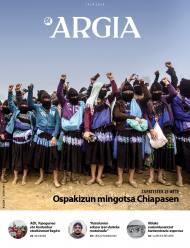





.jpg)

